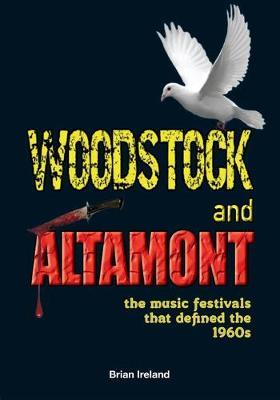Woodstock and Altamont

Woodstock and Altamont
It explores the festivals' organisation, promotion, and unfolding, as well as their immediate and enduring impact. The book is also about the 1960s, particularly the political, social, and cultural changes that provided the context for these festivals. A catalyst for these changes was the `baby boom' that provided the `foot soldiers' for both the Vietnam War and the counterculture that opposed it. It also provided the audiences for music festivals such as the annually recurring Newport Folk Festival, and for one-off events like 1967's Monterey and of course 1969's Woodstock, and Altamont. The activism of this young generation, the `New Left', looked to American values of freedom and democracy, but found them undermined by rampant consumerism, political assassinations, and by the horrors of the Vietnam War.
All of this is explored behind the backdrop of the music festivals to form a broad social agenda for change that, by the time of Woodstock, transformed how Americans viewed themselves and their society.
The Altamont Speedway Free Festival occurred just a few months later. Meant to be a `Woodstock West' it is nevertheless remembered as the antithesis of Woodstock, mainly because of the violence that unfolded and especially the tragic death of Meredith Hunter - killed by Hells Angels who were employed to provide security at the festival.
Country Joe McDonald, a notable performer at Woodstock, sums up the popular memory of both festivals: "Woodstock and Altamont seem like bookends to the great social experiment of the late sixties.' The former seems proof that hippie idealism about peace and love was possible; Altamont, however, seems to reflect the dark side of the hippie dream - the flip side of the coin which has Charles Manson's face upon it.
PRP: 135.93 Lei
Acesta este Prețul Recomandat de Producător. Prețul de vânzare al produsului este afișat mai jos.
122.34Lei
122.34Lei
135.93 LeiLivrare in 2-4 saptamani
Descrierea produsului
It explores the festivals' organisation, promotion, and unfolding, as well as their immediate and enduring impact. The book is also about the 1960s, particularly the political, social, and cultural changes that provided the context for these festivals. A catalyst for these changes was the `baby boom' that provided the `foot soldiers' for both the Vietnam War and the counterculture that opposed it. It also provided the audiences for music festivals such as the annually recurring Newport Folk Festival, and for one-off events like 1967's Monterey and of course 1969's Woodstock, and Altamont. The activism of this young generation, the `New Left', looked to American values of freedom and democracy, but found them undermined by rampant consumerism, political assassinations, and by the horrors of the Vietnam War.
All of this is explored behind the backdrop of the music festivals to form a broad social agenda for change that, by the time of Woodstock, transformed how Americans viewed themselves and their society.
The Altamont Speedway Free Festival occurred just a few months later. Meant to be a `Woodstock West' it is nevertheless remembered as the antithesis of Woodstock, mainly because of the violence that unfolded and especially the tragic death of Meredith Hunter - killed by Hells Angels who were employed to provide security at the festival.
Country Joe McDonald, a notable performer at Woodstock, sums up the popular memory of both festivals: "Woodstock and Altamont seem like bookends to the great social experiment of the late sixties.' The former seems proof that hippie idealism about peace and love was possible; Altamont, however, seems to reflect the dark side of the hippie dream - the flip side of the coin which has Charles Manson's face upon it.
Detaliile produsului











